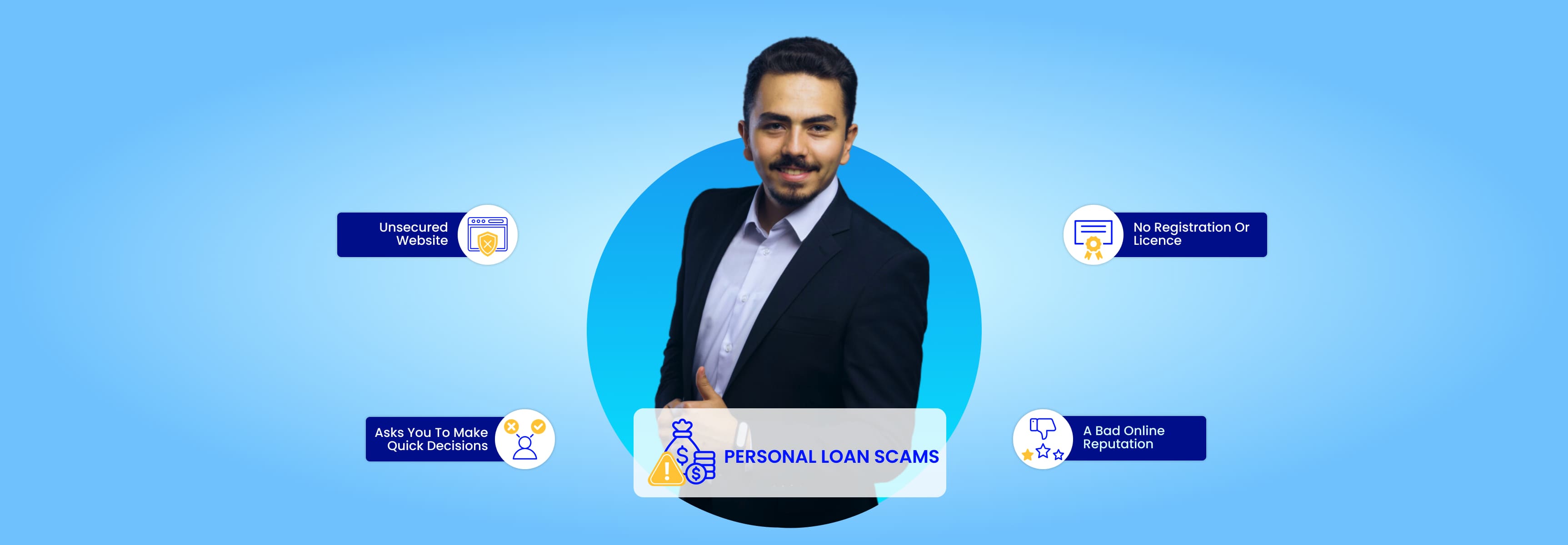
A coin always has two sides. In this digital era, digital transactions have made our lives easier and more seamless, offering a range of flexible options. However, as we have adapted to this ever-evolving technology, so too have digital fraudsters, leaving unsuspecting victims with significant financial losses.
Out of many loan scams happening online, personal loan scams spare no one from online fraudsters, who are always looking for people in urgent need of finances. The scammers know how to lure personal loan borrowers and obtain as much personal information and sensitive details as possible or make them pay upfront fees in the hope of having quick access to their desired loan.
Below are some tricks and gimmicks of the fraudulent players. Beware of them and become vigilant about personal loan scams.
If you find yourself in any of the following situations, consider them as loan scams and protect your hard-earned money at any given time.
Don’t we all think twice and thrice before buying luxury for ourselves? Do you agree that most of us like to keep track of every dollar spent? After all, it's our hard-earned money that we can’t afford to lose. So, when it comes to making such a big decision as getting a loan, don’t we all need enough time to make the right decision?
However, the scammers do not want us to make a mindful decision that favours the right idea; hence, they will want us to jump to rough, quick conclusions that are fruitful to them. Often, they will lure us with limited-time offers or proposals that use smart, false tactics. In the worst-case scenario, they can lure us in by threatening and pressuring us with legal action.
Legitimate lenders won't charge an upfront cost to process a personal loan or review personal loan documentation. However, scammers do not care about their profiles. In the name of a loan application or processing fee, they would want to fetch money from you even before the loan is sanctioned.
To flee as quickly as possible, they will also make you pay using untraceable methods, such as cash, prepaid debit cards, or through easy access with bank accounts. Read the paperwork carefully before signing any such agreements. They will leave with your money, leaving no crumbs to trace.
Unlike platforms like Quid, you can rest assured of zero hidden charges and transparent communication throughout your process as we match you with RBI-approved lenders.
Often, in loan scams, the lender manipulates you into believing they come from somewhere and confidently gives all the wrong information about their address and contact details. There can also be times when you sense the lender's physical location is unclear, and they insist on discussing loan details at your home.
Conduct a thorough background check and visit their office location to be fully protected from any misleading or fishy activities; in the end, it is very difficult to track them if things go south.
One of the best practices one can follow before falling prey to scammers is double-checking the source from which they come. One of the ways to rest assured of their credibility and legitimacy is by verifying their credentials and regulatory compliance.
If you can’t get justifiable proof of their licence, which is required to operate in India, you are most likely dealing with a scammer. You can verify whether the potential lender is registered in the respective state by contacting the state attorney general or banking and financial services regulator.
It might be one of these loan scams if it looks like a smooth icing on the cake with a top-notch cherry that complements it. There can be many factors that might sound too good to be true. All of these elements should raise red flags, especially if the money lender offers lenient terms and conditions, the interest rate seems too good to be true, or the bank or lender itself seems relatively unknown.
If the lender or the company shows a bad online reputation, then it's an alert to stay away from falling into their traps. On online forums and communities, if you find people bad-mouthing or sharing their genuine bad experiences with them, then it shows that they are not reputable in the market, and chances are that they are scammers in the market.
You can always look for social online communities and forums on social media and the internet by looking up their names or the companies that they represent. In a digital era, it is very important to become familiar with such malpractices that can happen online.
When you are researching the potential lender's website, make sure that it has a padlock symbol next to the website address wherever you are required to fill out your personal bank details.
The padlock symbol, meaning a secure website, ensures your data is secure. However, this is not a foolproof way, as many websites would still have a security certificate even though they are part of loan scams; not having one on a lender’s website should instantly warn and draw your attention.
As the saying goes, prevention is always better than cure. Protect yourself from scammers and do your homework before applying for any personal loan. Educate yourself so that you won’t be caught up in personal loan scams; these few important tips will come in handy and save you from a nightmare.
With clear transparency, a trusted online presence, and legitimate registration, you can find a reputable lender with a sound background. At Quid, we match you with RBI-approved lenders with our easy, personalised loan match-making to help you find the most suited personal loan with competitive interest rates and flexible repayment options.
Get credit at first sight and be closer to your goals.
Download Now